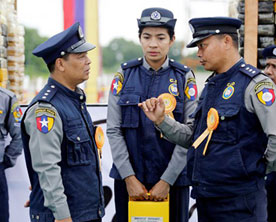Between June and August 2017, MyJustice conducted the largest, statistically significant survey on justice issues undertaken to date in Myanmar. This policy brief introduces findings around the four main themes explored:
- Justice and the law
- Who provides justice?
- One size does not fit all
4. Vulnerability matters 33,565 people over the age of 18 were randomly selected from across all regions and states in Myanmar. The respondents broadly represent the national demographic profile, in terms of gender, education and urban and rural classification. MyJustice also conducted qualitative research—indepth interviews and focuses group discussions—in an additional 20 townships.
Justice and the law
People do not see the law or its institutions as providing access to justice. Building public confidence requires demonstrable changes in how the law is used in practice, and not just efforts to increase awareness of the law. Across Myanmar there is a common understanding that ‘justice’ describes principles of fairness and equality. Nine in ten people fully agree that everyone should be treated fairly and with respect when facing justice issues. Similarly, 85% of people believe that the needs of vulnerable people should be taken into consideration in providing justice. But people do not see the role of the law or the work of justice sector institutions as protecting rights. They view the role of the law as a means to control people and ensure public security, rather than providing just processes for protecting people’s rights or resolving disputes. One in five people do not know what the purpose of the law is.
Awareness is not the primary challenge; it is lack of trust in how law is administered. It is commonly assumed that people lack knowledge of the law, but across a range of legal topics, people had a generally good idea of what the laws contained. Rather, their perception of the role of law seems to come from a collective experience of how the law has been administered in Myanmar’s recent history. Justice institutions recognize that low public trust remains a critical issue. Based on this evidence,
government institutions may need to demonstrate a commitment to better interaction with the public if they seek to improve trust. This needs to start by placing the views and experiences of Myanmar’s people at the center of the design and implementation of justice sector reform strategies.
Who provides justice?
Justice remains inaccessible for many people. Local actors—in particular ward or village tract Administrators (W/VTA)—play a key role, but have not been a focus of justice reforms so far. A significant number of people do not have confidence in anyone to provide access to justice across several key indicators. Over 28% claim that no actor will provide services without asking for unofficial fees and 18% believe no actor will settle disputes without bias. The study highlighted the central role played by local actors in resolving disputes in Myanmar, including in relationship to higher level justice actors. Overwhelmingly, people identify the ward or village tract administrator (W/VTA) as the primary actor for justice functions. These tasks include maintaining security, preventing and investigating crime and punishing offenders. Justice sector officials were identified as having a role for only three tasks: investigating crime, punishing those guilty of crime and determining guilt or innocence.
Other actors also play a role. One in five or more view the 10/100 household leader as playing a role and identify community elders as supporting the W/VTA. Some evidence reveals that the W/VTA play the role of gatekeeper, determining which issues to refer to the police or using the threat of referral to police or the courts to pressure parties to accept local resolutions. There is no clear guidance for or oversight of the various authorities, how they interact or the fairness of how disputes are resolved. The type of dispute is likely to predict the choice of actor. If faced with issues that are perceived as belonging to the domestic or community sphere, people say they will approach a W/ VTA. If faced with criminal disputes people show a clear preference for the police. Responses show that if faced with administrative disputes, people generally report they don’t know what to do or whom to approach.
To improve Myanmar’s justice sector, we must engage with local actors. They play prominent roles in delivering justice services and often enjoy higher levels of trust in the community. This requires clearer connections between justice policy and reforms in local governance mechanisms, which should include linked mandates and appropriate checks and balances.
One size does not fit all
People’s justice needs are closely linked to their economic security and social well-being. Understanding these different needs is essential in developing effective justice responses. Disputes occur at a similar rate to other developing countries in Asia. Almost 17% of people report that they or someone they know have experienced a dispute in the last two years. Of those, just over 5% report experiencing multiple, often interrelated, disputes. Many disputes have the potential to impact the ability of households to earn a living or access other basic services. The three most reported types of justice issues are unpaid debts (32%), difficulties in accessing birth and identity documents (23%); and land registration (11%). Certain types of disputes, particularly relating to domestic violence, are probably underreported.
When people face disputes, no action is taken in nearly half of all cases. Where action is taken, most people seek to address issues locally, through the W/ VTA or direct negotiation. People are less likely to act on debt-related disputes in comparison to land or identity issues. Most justice issues are closely connected to the capacity of households to earn a living or reduce day-to-day livelihood risks. This highlights the important relationship between justice services and broader social development efforts, beyond the courts and lawyers.
Vulnerability matters
There are groups of people that are more vulnerable and disempowered in relation to justice. This includes those from particular ethnic or religious groups, those with low education, rural inhabitants and women. Certain groups experience multiple justice issues more often. People from particular ethnic or religious groups are more vulnerable to experiencing multiple justice issues, which compounds the effects of injustice.
But they are less willing or able to recognize these as injustices or to seek redress. People who live in rural areas, women and people with low education are more likely to answer “don’t know” or not respond at all to various survey questions.
People who fit in a combination of these categories are likely to be even more vulnerable and disempowered in relation to justice issues. Women from rural areas with low education — comprising over 17 per cent of the adult population—are almost twice as likely to lack the ability to respond. Data from the research suggests specific ethnic or religious groups face similar constraints. Vulnerable people are more likely to experience multiple disputes and less able to recognize these as injustices and seek redress. Further research is needed to understand the implications of this ‘compounded disempowerment’ and to identify appropriate strategies to improve universal access to justice. The Government of Myanmar has acknowledged that “weaknesses in the rule of law places a daily burden upon our people, particularly those who are poor and vulnerable, and presents a barrier to achieving durable peace, stability and sustainable development”. Responding to these challenges will require building a more just, equitable and accessible legal system. Evidence is essential for ensuring that policy priorities respond to people’s needs and are actionable.
To improve access to justice in Myanmar, justice sector reforms should demonstrate real change, justice should be part of local governance and justice should go hand-in-hand with poverty reduction.
The research emphasizes the importance of access to justice as a prerequisite for sustainable poverty reduction and equitable social and economic development. This is consistent with the expanding evidence-base globally on how justice is essential for sustainable development. The findings identify the negative impact a lack of justice can have on the livelihoods of the poor and vulnerable, particularly for issues such as land, debt or challenges in accessing administrative services. The poor or specific vulnerable groups are also significantly more disempowered in accessing avenues to address justice issues. Access to justice should be at the center of the Government of Myanmar’s efforts to reduce poverty and build durable peace.
Justice sector reforms should explore ways to integrate with other basic services including health and education and promote accountable government service delivery to meet the needs of Myanmar’s most vulnerable communities, including those affected by conflict.
MyJustice, an access to justice programme, aims to equip the people of Myanmar with knowledge, confidence and opportunities so that they can resolve conflicts fairly, equitably and justly. The program work closely with local communities to achieve a lasting impact on the way disputes are resolved and justice is delivered, especially for poor, vulnerable and marginalised people.










